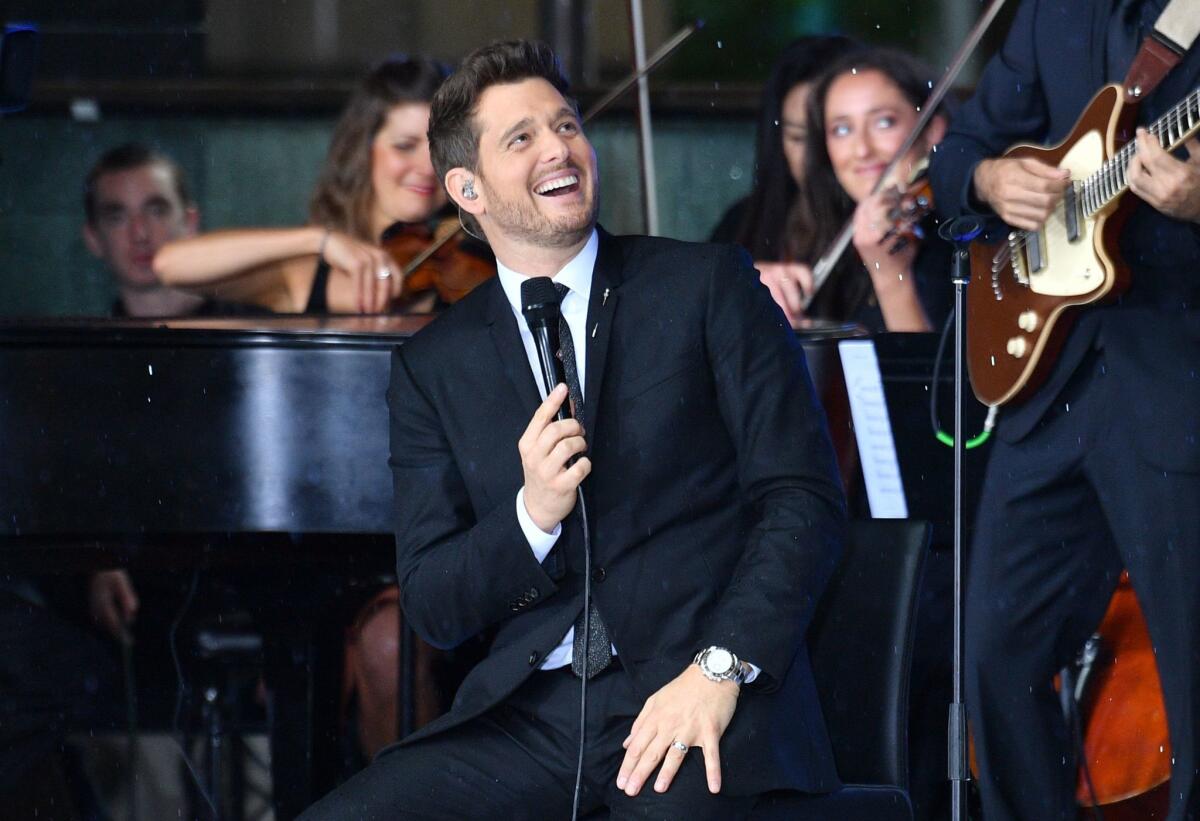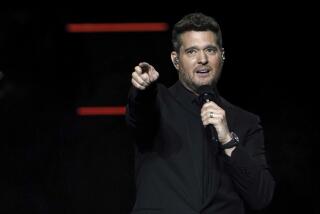Michael Bublé on his son’s cancer: ‘I can’t wait to never talk about it again’

“Ga-JENK-jenk-ga-JENK-jenk-ga-JENK,” Michael Bublé sang, strumming an imaginary guitar with his right hand as his left foot kept time on an imaginary kick drum. “Ba-BA-da-BOOM!”
Seated — just barely — at a dining table in a West Hollywood hotel suite, the throwback crooner was excitedly using his body to demonstrate a vintage Quincy Jones groove he said he couldn’t get out of his head while he was recording his new album, “Love.”
In the studio Bublé would play the hard-swinging rhythm, from Jones’ arrangement of the standard “Please Be Kind,” over and over on his laptop; he’d badger his producer, David Foster, to help him match the groove to another tune.
“We must have gone through 40 different songs,” Bublé recalled, until finally they hit upon the right one: “I Only Have Eyes for You,” the dreamy romantic ballad that, sure enough, sounds great atop Jones’ jumping beat — tender but sexy, earnest yet witty, timeless but also fresh in a way that ditty hasn’t felt in years.
“I was, like, ‘Aha!” he said, describing the result as a long-fought creative victory. Then again, he added, the real win might’ve been that he was fighting at all.
Two years ago, this Canadian singer — who rose to fame in the early 2000s with his ring-a-ding revival of pop classics such as “Feeling Good” and “Save the Last Dance for Me” — abruptly put his career on hold after his son Noah, then just 3, was diagnosed with liver cancer.
Bublé abandoned promotion of a record he’d just released; he called off a planned world tour. The suggestion was that he might be finished with music, unable to focus on anything that didn’t directly correspond to his son’s wellness.
Now Bublé is back. With Noah in remission, the 43-year-old singer says he made “Love” — the album’s official title is the shiny red heart emoji — as a means of moving beyond the struggle that turned his life upside down.

“I told myself, if I do another record, it has to be a total love-fest,” he said over coffee on a recent afternoon. He walked in wearing a black leather jacket, and when he took it off, the names of his three children — Noah along with 2-year-old Elias and a daughter, Vida, born in July — could be seen tattooed on the inside of his right arm. (Bublé is married to the Argentinean actress Luisana Lopilato.)
Yet as much as “Love” represents a way forward, it’s also a return, after 2016’s unconvincing “Nobody but Me,” to what Bublé does best, which is re-imagining durable standards with style and emotion.
Working again with Foster, who’d produced Bublé’s first several albums before sitting out his last few, the singer gives “When I Fall in Love” a lush romantic throb and presents “La Vie en Rose” as a yearning duet with the brainy jazz star Cécile McLorin Salvant; “My Funny Valentine” gets a cool spy-movie makeover, while “Unforgettable” recovers the grown-up sensuality of a tune that’s become a staple of father-daughter dances.
Last week “Love” entered Billboard’s album chart at No. 2, with Bublé’s quadruple-platinum Christmas record from 2011 making its annual reappearance on the tally not far behind.
Asked how the experience with Noah shaped the album, Bublé said it made him want to create something with some of the same compassion that he and his wife had been shown.
“It’s really easy right now to look outside your bubble and think that the world has become this cynical, terrible place,” he said. “But we saw a lot of good. And I think both of us felt a responsibility to pay it forward.”

He was less eager to go into detail about the pain that brought on that kindness.
“My son’s story is a story he’s going to tell one day,” he said. “It’s not for me. And I don’t want him to be exploited in any way, or for me to do that even accidentally.”
Indeed, one wonders if Bublé has developed some stock responses as he’s made the rounds — from “Carpool Karaoke” to the “Today” show to interviews like this one — talking up his album: carefully crafted statements that satisfy the appetite for celebrity confession without commodifying a family’s private trauma.
He nodded in recognition of the idea.
“I’m not careful with my words, but I’m careful with the information,” he said. “And I’ve had a few interviews where I’ve said, straight up, ‘I know you’re a good person doing your job, but I’d like to move on, and if we can’t then we should end this now.’
“But it’s weird, man,” he continued. “I can’t wait to never talk about it again. At the same time, it’s impossible for me not to acknowledge that everything I am — everything I’m doing — is because of it.
“And you hear that in this music. I think you hear clarity.”
Noah’s sickness triggered a realization, Bublé explained, regarding his reasons for singing.
“Before this all happened, I’d kind of forgotten what it was I loved in the first place,” he said. “Instead of enjoying the moment, I was starting to worry about losing what I had.”
Convinced he needed to shore up his fan base — he was obsessing over record sales and “ticket numbers in Albuquerque” — he took a hard turn toward the Top 40 on “Nobody but Me,” working with producers and writers who pumped up his sound with muscular hip-hop-style beats.
“I thought I needed to be someone else,” he said.
Today he stands by the original songs he wrote for the earlier record, including the title track, which featured an unlikely rap verse. But the presentation, he admits, was iffy.
“Performing on TV, I suddenly didn’t know how to move,” he recalled with a laugh. To demonstrate what he meant — you gather pretty quickly that Bublé is a guy given to demonstration — he pulled out his phone and played a clip of Ricky Bobby, Will Ferrell’s comically awkward character from “Talladega Nights.”
“That was me, basically: ‘What do I do with my hands?’ ”
Bublé seems comfortable again on the more old-fashioned “Love”; this is the singer in the natural sweet spot he’s happier than ever to occupy.
“Making the music I love with the people I love — that’s what’s important,” he said. “Sometimes people don’t get that perspective until the very end of their career.
“It didn’t happen like that for me.”
Twitter: @mikaelwood
More to Read
The biggest entertainment stories
Get our big stories about Hollywood, film, television, music, arts, culture and more right in your inbox as soon as they publish.
You may occasionally receive promotional content from the Los Angeles Times.











